This post about making piano lessons fun was originally posted as 2 separate articles in February 2018 and March 2018, and updated in August 2020.
Has a parent ever gotten in touch with you about signing up for lessons and said something like:
“I don’t want him to be a concert pianist or anything like that.
I just want him to have fun!”
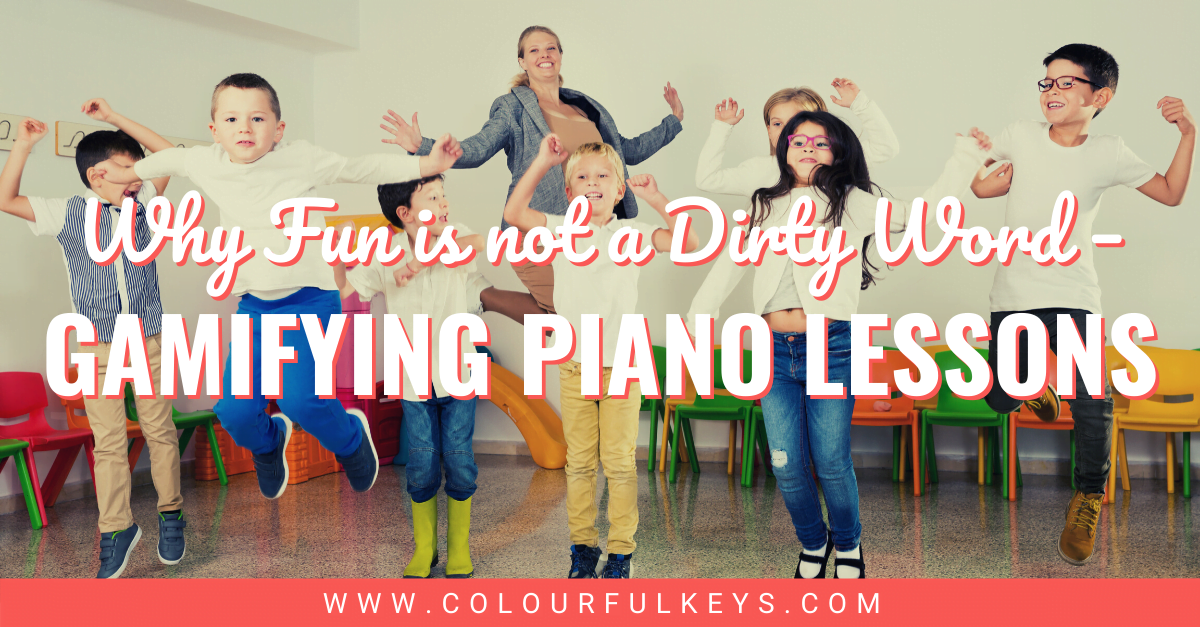
Many teachers balk at this, and I get why. As teachers, our minds are swimming…
- This parent is not going to get their kid to practice.
- They don’t value the work that goes into learning an instrument.
- They don’t see this as real education.
In short, we’re a bit put-off.
But think again. If we put our magic parent-translator-headphones on, perhaps what they’re saying is:
“I was a bit miserable in my own lessons growing up.
I want my son to have a better experience.”
Or maybe they’ve never experienced lessons themselves, but they have a vision in their head of the stuffy, strict and uncompromising classical teacher. Maybe they just want their child to love music.
Why You Should Gamify Your Teaching
Are you a fun-ist or a fun-o-phobe?
It’s that serious (and yes, slightly stuck-up) classical tradition that has led us teachers to be prejudiced against fun.
Irish dancing used to give people this impression too (albeit in a very different way). People saw the stiff arms & costumes, precise and finicky steps, and thought it looked…a bit uptight.
But that was turned around when Riverdance came on the scene. People saw a whole new modern side to Irish dancing. It could tell a story, and some freedom could be given along the way.
Just as arm movement and flowing skirts can have their place in Irish dancing, so too can fun be brought into your studio.
Games and gamification can provide you with a whole new way to connect your students to music.
The Point of FUN
Fun isn’t just about fun.
We’re teachers, first and foremost, and I am in no way suggesting that you set aside or water down what you’re teaching. What I want you to do is make it better.
You see, if you’re making piano fun, students will be engaged and will learn more thoroughly.
They’ll make faster progress because learning will be easier and piano lessons won’t feel like “more school”.
And faster progress means they’ll get to play more interesting music earlier on in their studies – which is energising and motivating for them and for YOU.
Planning lessons with fun at the heart is also more fulfilling for you as a teacher. It means you have more variety in your day, repeat yourself less often, and get to giggle regularly.
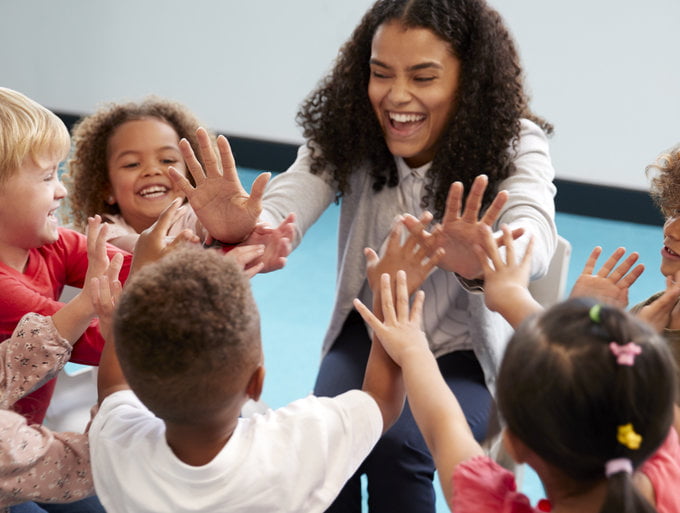
It also makes for happier parents, which means your student retention rates will skyrocket.
But I don’t have enough TIME!
So, perhaps I’ve convinced you that fun is important. Or maybe you didn’t start reading this as a “fun-ist” or a “fun-o-phobe” in the first place.
But, maybe (or very likely) you’re thinking right now:
“Yeah, great Nicola. That all sounds wonderful, and I get what you’re saying – but I don’t have time for this frivolity! How can I fit this in?”
This is the wrong question. If you’re asking how to cram fun into your lessons, then I haven’t been clear enough yet.
This is not an element of your lesson plan, or an off-bench activity, or a 5-minute exercise in laughter. This is a way of approaching all your teaching.
If you do it right, you won’t just be making piano lessons more fun – you’ll also make your teaching more efficient and effective.
This isn’t about putting aside the work. It’s all about making that work more digestible and easier for students. There is no formula or equation for how I balance work and focus with fun stuff in my studio because they are the same. The fun is how the work gets done.
When you think about things from the right frame of mind, even something as serious and dull sounding as note stem rules can become seriously fun.
How to Gamify Your Teaching
The following plan of action will put fun and games to work for you. It will help you to make the most of every single minute of lesson time you have available, making piano lessons fun as a bonus.
Time for a not-so-elegant mnemonic. You ready?
- Find the gap
- Understand the route
- Never reveal the secrets
Find the Gap
Gap is my all-inclusive term for anything you want to teach to your student. It could be something they’ve not encountered yet, a new level to add to old information, or an error you’ve noticed in their playing.
Put another way, the question is, “What, exactly, do you want your student to learn?”
Understand the Route

This is the missing trick for many teachers. I know it certainly was for me when I started. We want to jump straight from the thing they don’t know to…well, to them knowing the thing.
But there might be connecting parts. Is this concept or idea something which they have the proper foundations for? What are all the steps along the way to true understanding?
Never Reveal the Secrets
When you’ve done all this planning and mapping of a good route – with some amazingly fun stops on the way – you need to let it unfold with your student.
Become the furiously paddling swan and don’t let the signet know that you’re guiding her towards to solution. She needs to discover it for herself.
Avoid telling your student. Children learn through play. Give her the opportunity to mess around with and experience the idea before you boil it down to a definition or a term.
Remember, your job is to facilitate your student’s learning. Making piano lessons fun is just a side effect.
Example Case 1: Ledger Lines
Finding the Gap
Some students see a ledger line and just…FREEZE. What is that ugly looking thing? How on earth are they supposed to remember what note that’s supposed to be?!
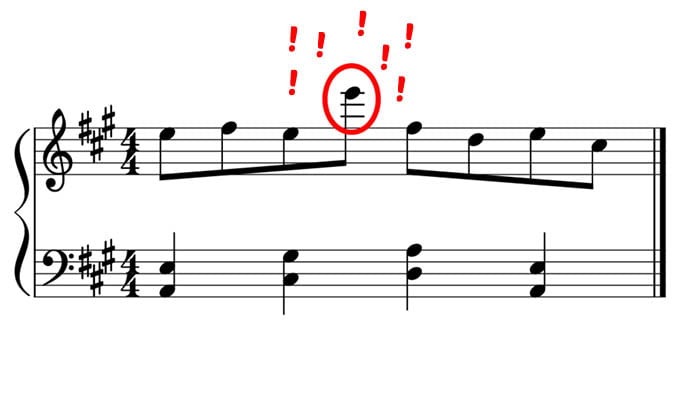
(Or, worse still, they just assume it’s a C. Because all ledger line notes are C, right? 😉 )
But we don’t want them to “remember” these notes. Not really. We want them to understand how the staff works – that this is just an extension of the same system.
If they can’t see it that way, then there’s a disconnect happening. And it won’t be fixed by telling them what this particular ledger line note is.
Understanding the Route
Here’s the route to having students see ledger lines the way we want:
- Understand what ledger lines are.
- Be able to “use” ledger lines.
- Connect the dots between the entire grand staff and the ledger lines.
- Have a reliable system for working out ledger line notes when they come up.
We could just have jumped straight to that last point. But that would be just be a temporary fix.
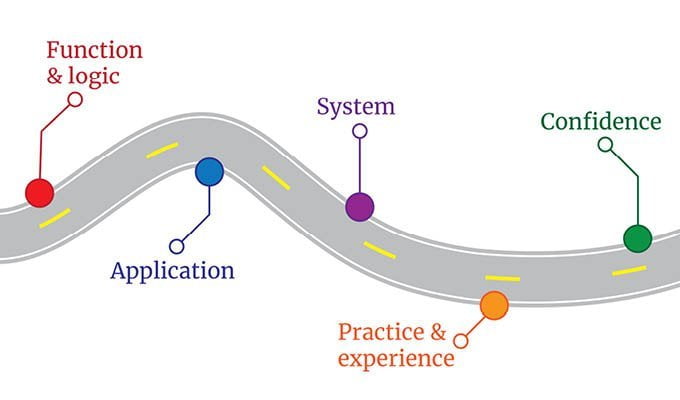
Not understanding ledger line notes is a symptom of a bigger issue: Not understanding the staff. If we just skip over the symptom, it’s going to lead to big problems later on.
Never Revealing the Secrets
Now that we understand the exact nature of the journey we want our student to take, it’s easy to plan activities that will lead them down the track.
Staff Construction
Get your student to draw a staff on a piece of paper or small whiteboard. Play one note at a time, starting in the centre of the piano with B and D.
Ask your student to draw the note and write the note name in the centre for each note you play.
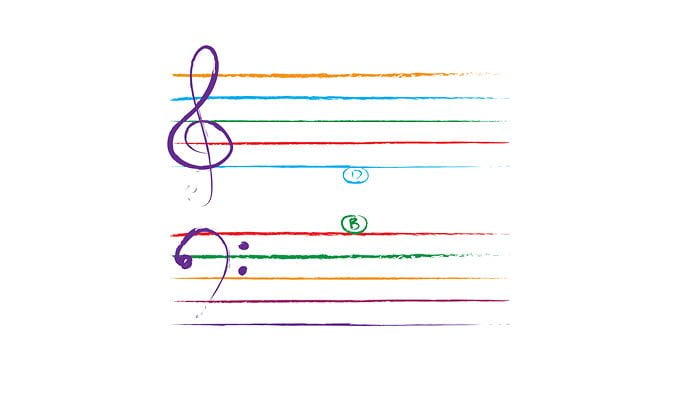
When you get to low F and high G, just keep going and observe what your student does. She may draw the ledger line without assistance, she might just draw a note with no line, or she may just stop and stare at you.
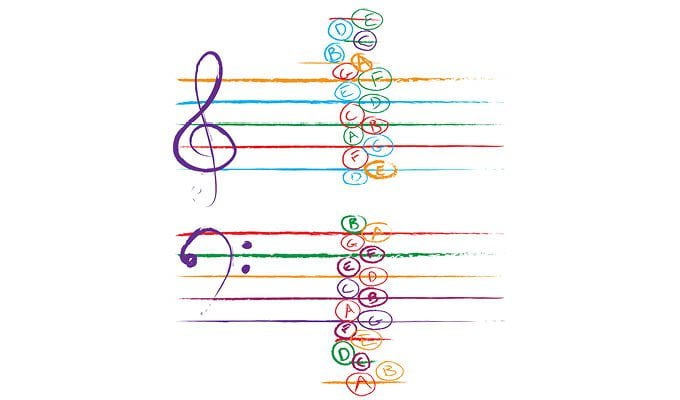
Ask your student questions to guide her towards the correct way to draw this note – then continue going to higher and lower notes until you’re sure she gets how the system works.
Chopsticks & Plasticine
Take a sheet with the note names arranged in a line, and a clef, but no staff lines.
Ask your student where the chopsticks should go in order to make the lines of the staff. Help her as needed and take out some sheet music to use as a reference if she’s struggling.
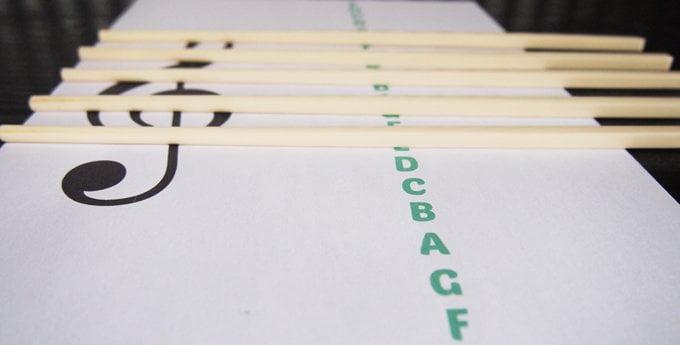
Once she has her chopstick staff, ask her about those other notes floating outside the lines. What does she think we need to do to give those notes a home?
This is where the plasticine comes in. Roll out a little plasticine line and place on on a floating note, then have your student make lines for the rest of the floating lines.
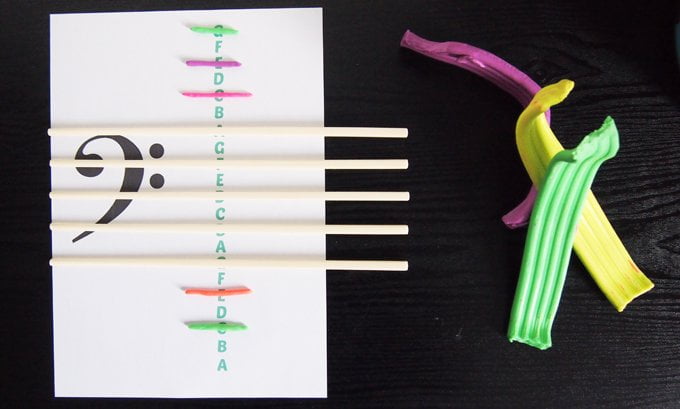
Subscribe to the newsletter and get the chopstick ledger line sheet
Enter your details to subscribe to the newsletter for piano teachers with information, tips and offers.
I hate spam as much as you do! I will only send you emails related directly to piano teaching and you can unsubscribe at any time.
VMT members can download the Chopstick Ledger Line Sheet instantly from the VMT library.
Legend of the Ledgers
Now that your student “gets” the staff, she’s ready for Legend of the Ledgers, available instantly for Vibrant Music Teaching members.
Not a member yet? Find out what you’re missing out on!
This game will further emphasise the relationship of the treble and bass staves, and all the ledger lines on top and underneath. Students move around by interval and get plenty of practice naming ledger line notes.
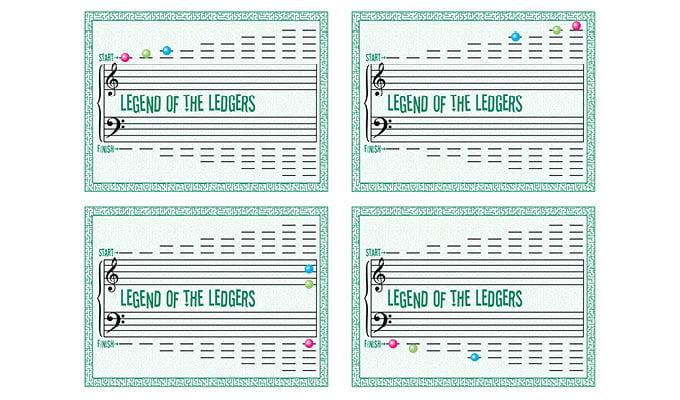
Competition & Glory
The final ingredient you need for ledger line success is speed. Get your students into the 60-Second Challenges and they’ll be pros in no time!
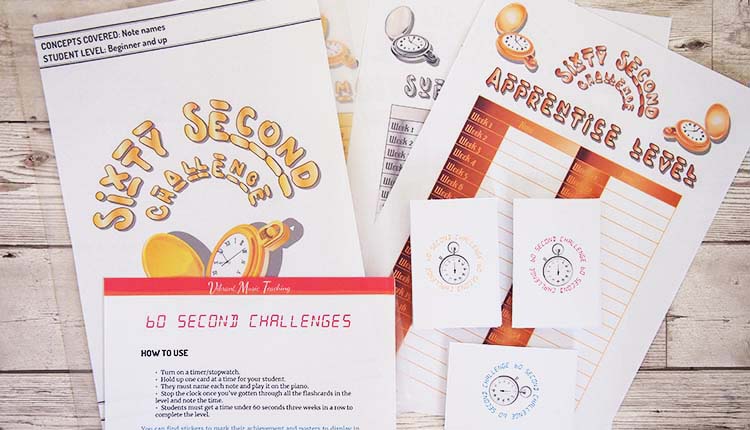
Subscribe to the newsletter and get the 60 Second Challenges Kit.
Enter your details to subscribe to the newsletter for piano teachers with information, tips and offers.
I hate spam as much as you do! I will only send you emails related directly to piano teaching and you can unsubscribe at any time.
If you’re a VMT member, you can grab the 60-Second Challenge Kit now from the printable library.
Example Case 2: Chords & chord inversions
Finding the Gap
First you need to know why you want to teach your student about chords and their inversions.
- Is it for a theory exam?
- So they can identify them in their pieces?
- So they can play leadsheets?
We’re going to take that last instance as our example, but any of those are valid aims. Just don’t head towards all sides at once. Pick one destination, and the rest will come with time.
Understanding the Route
If our goal is for our student to be able to use chord inversions in their leadsheet playing – we want to focus on the shapes at the piano more than the written notation.
- Major/minor chords review.
- Inversion construction at the piano.
- Recall by instinct.
- Playing leadsheets using inversions.
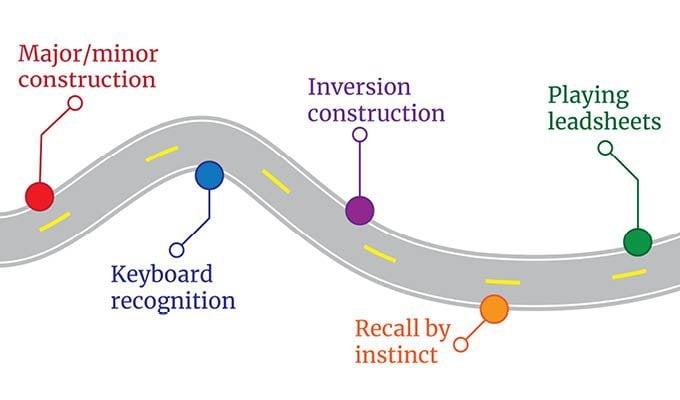
The emphasis on patterns of semitones (half steps,) rearranging and pattern recognition will mean that it’s easier for your student to find the shape they need under her hand.
Never Revealing the Secrets
It’s time to plan some activities that will help your student move from vague notions of chords to lead sheet-playing superstars.
iReal Pro
After the initial understanding is in place of the 4 semitones / 3 semitones pattern, your student needs lots of practice with just major chords.
My favourite way to do these kinds of drills is with an app called iReal Pro. This is a super flexible backing track app that’s available on pretty much every OS, and it’s long been on my list of essential piano teaching apps.
We use this to drill first all the white key major chords, and then all the major chords. My students love choosing the different backing track styles and challenging themselves to go faster each time.
VMT members: Head over to the library to download my iRealPro playlist of backing tracks to accompany the Piano Chord Challenges.
Don’t Minor My Major!
Don’t Minor my Major! is a great game for practising major chords and their relationship to the minor chords.
Combined with the practical drills at the piano, our student will be well on the way to knowing the root position chords back–to–front in no time.
Not a VMT member? My iReal Pro chords playlist and Don’t Minor My Major! are just two more reasons to become a member today.
Keyboard Mapping
When it comes to inversions, I like to start with keyboard mapping.
I ask my student to create a chord on the piano, using erasers or tokens to mark it out. Then I move the bottom eraser up to the top to create the first inversion – and ask my student what I’ve done.
We talk about how this works, and play lots of inversions and root positions so she can hear how they sound the same, but different.
Going forward we do a few minutes of practice at each lesson, mapping out chords in various positions all over the piano.
Inversion Diversions
After a few weeks of this training, our student will be ready for the finicky but fun game Inversion Diversions – available to members instantly in the VMT library.
Inversion Diversions has options for keyboard pictures or staff versions of the cards. Students have to identify the chord correctly to move around the board. The inversions are emphasised by the fact that the players have to switch paths based on which type of chord they drew.
You guessed it! If you’re not a VMT member, Inversion Diversions is another reason to check out the membership benefits.
Competition & Glory
After this initial knowledge is in place, you might like to inspire your student to extra practice of chords using my challenge posters and stickers. Super fun and motivational!
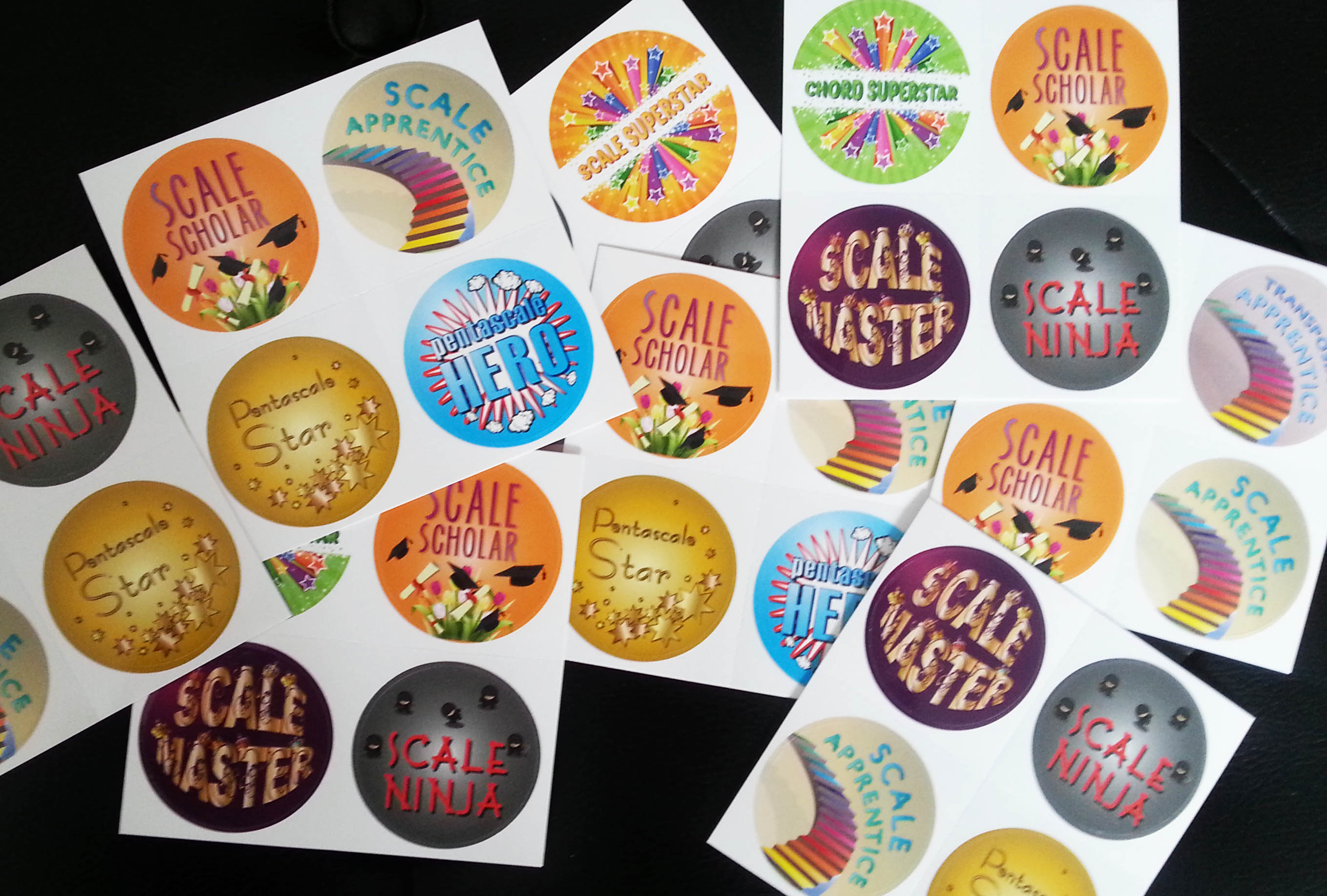
Subscribe to the newsletter and get the challenge posters and stickers
Enter your details to subscribe to the newsletter for piano teachers with information, tips and offers.
I hate spam as much as you do! I will only send you emails related directly to piano teaching and you can unsubscribe at any time.
VMT member already? Head over to the library to download the Challenge Posters and Stickers.
How would your teaching change if you tried this approach?
What do you think of my approach to making piano lessons fun by planning effective theory teaching? Let me know in the comments below or in the Vibrant Music Studio Teachers group on Facebook.
For more help planning fun and engaging lessons, visit my page devoted entirely to Planning Piano Lessons.
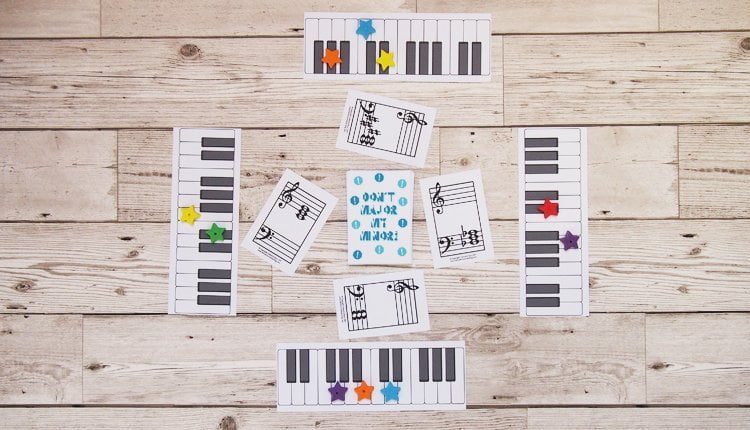
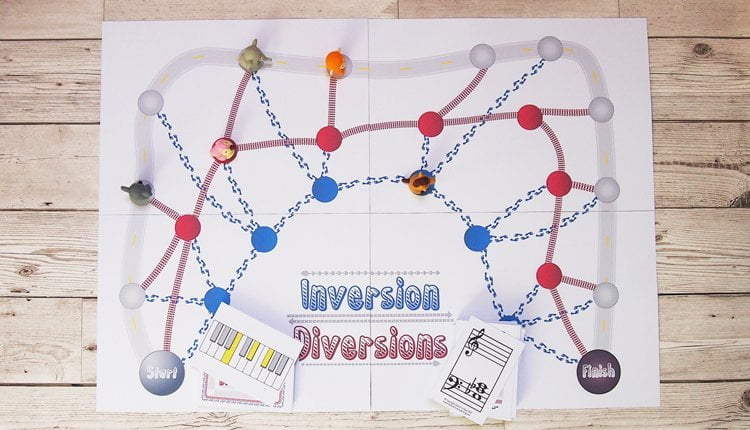
I always tell my parents in our initial communications that their children will play games and do fun and silly things at the piano, but that does NOT mean they are not learning. Children learn through play and so that is how I teach. I can always improve my teaching, but because my students have fun and enjoy coming to their lessons, they WANT to learn and practice. I have a full studio and a wait list with at least 10 students on it. I fully believe that FUN is why! Thanks for all the fun ideas you’ve given me over the years!!!
A teacher asked me this at the related talk I gave at the expo: “don’t parents ever complain that the kids are just playing games?” So I love that you address this with them at the start.
I think once you develop that reputation though, people seek you out for it rather than baulk at it. That’s what happened for me and for you anyway!
Love that Dana! And love this post, Nicola! Looking forward to part 2. 🙂
Thanks Jennifer! So happy you enjoyed it. 🙂
Nicola…the first thing on my list for a successful lesson is to have a laugh.
You have summed up my feelings exactly….hey it can even be a stuffy lesson when it has to be ……but it has a laugh.
It is so much easier to get kids to explore areas they don’t want to (fear of the unknown) when you present it in a happy way.
Often it is the parents who think you are wasting time…they don’t often realise that kids will put something into their memory bank BECAUSE they had fun with it.
Exactly Robyn! However, I find most of my piano parents actually fully get this. They’re totally on board with my goofiness because they can see the difference it makes! 🙂
I’m not fully engaged with games yet, at least not at the private lesson. I do play games in my group classes. however
,.As a general matter I love to joke around with students, act dramatic or silly or
play made-up games ( which are really drills)) that I conjure up on the spot!
I think you’re converting me to try some games and I think I have to approach the idea with a particular student and her needs in mind, first. Thanks!
I’m so happy to hear I’m “converting” you Maryjane. I hope it works well with your student and that you can bring more games into your studio. 🙂
Never thought that what I was doing was ‘gaming’ the lessons! I do integrate having students draw out staff to identify the notes; and introduce scales, chords and inversions very early in their lessons – just haven’t called it a ‘game’. I find it lends variety to the lessons and when they haven’t practiced the assigned pieces, it’s a good way to make use of the time rather that scolding them. Need to work more on the parents!